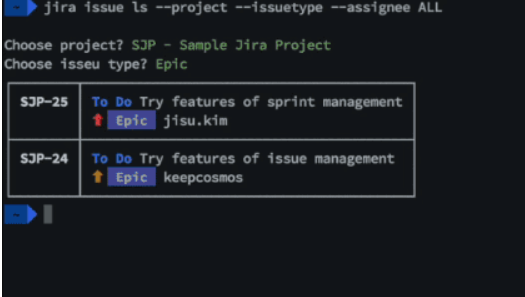JIRA ist ohne Zweifel eine der weltweit führenden Plattformen für Issue- und Bug-Tracking, und mit Terjira könnt ihr die JIRA-Funktionalität direkt in euer Terminal bringen. Terjira ist eine ultra-optimierte Bibliothek, die euch eine einfache JIRA-Schnittstelle der Terminal-Shell bietet.
Hauptmerkmale:
- Benutzerdefinierte Befehle für Boards, Sprints und Projekte.
- Ihr könnt Probleme sortieren, bearbeiten, erstellen und löschen.

Wie installiere ich Terjira?
Für euch selbst:
$ gem install terjira
Wenn ihr ein Berechtigungsproblem habt,
$ sudo gem install terjira # or $ gem install terjira --user-install # You need to export your gem path
Die Benutzung:
Authentication:
jira login # Login your Jira
# [--ssl-config] with ssl configuration
# [--proxy-config] with proxy configuration
jira logout # Logout your Jira
Project:
jira project help [COMMAND] # Describe one specific subcommand
jira project ( ls | list ) # List of all projects
jira project [PROJECT_KEY] # Show detail of the project
Board:
jira board help [COMMAND] # Describe one specific subcommand
jira board ( ls | list) # List of all boards
jira board backlog # Backlog from the board
Sprint:
jira sprint help [COMMAND] # Describe one specific subcommand
jira sprint ( ls | list ) # List of all sprint from the board
jira sprint [SPRINT_ID] # Show the sprint
jira sprint active # Show active sprints and issues
# To show issues on the sprint(include no assignee)
# pass `--assignee ALL` or `-a ALL`.
Issue:
jira issue help [COMMAND] # Describe one specific subcommand
jira issue ( ls | list ) # List of issues
# default assignee option is current loggined user
# To show issues of all users(include no assignee)
# pass `--assignee ALL` or `-a ALL`.
jira issue jql "[QUERY]" # Search issues with JQL
# ex)
# jira issue jql "project = 'TEST' AND summary ~ 'authentication'"
jira issue search "[SUMMARY]" # Search for an issues by summary
jira issue [ISSUE_KEY] # Show detail of the issue
jira issue assign [ISSUE_KEY] ([ASSIGNEE]) # Assign the issue to user
jira issue attach_file [ISSUE_KEY] ([FILE_PATH]) #Attach a file to issue
jira issue comment [ISSUE_KEY] # Write comment on the issue
# pass `-E` or `--editor` to open system default editor for composing comment
jira issue edit_comment [ISSUE_KEY] ([COMMENT_ID]) # Edit user's comment on the issue.
# If COMMENT_ID is not given, it will choose user's last comment.
jira issue delete [ISSUE_KEY] # Delete the issue
jira issue edit [ISSUE_KEY] # Edit the issue
# pass `-E` or `--editor` to open system default editor for composing issue description
jira issue new # Create an issue
# pass `-E` or `--editor` to open system default editor for composing issue description
jira issue open [ISSUE_KEY] # Open browser
jira issue url [ISSUE_KEY] # return url of the issue
jira issue take [ISSUE_KEY] # Assign the issue to self
jira issue trans [ISSUE_KEY] ([STATUS]) # Do transition


Neueste Kommentare